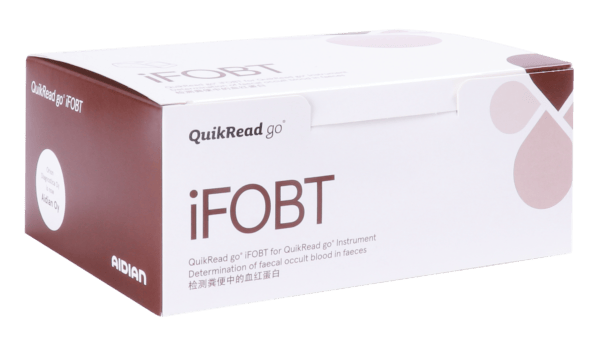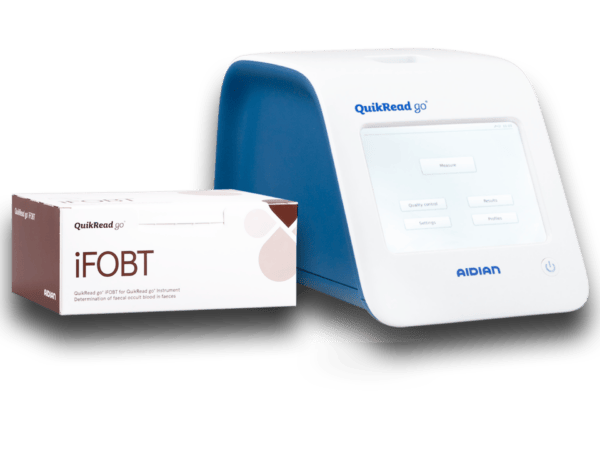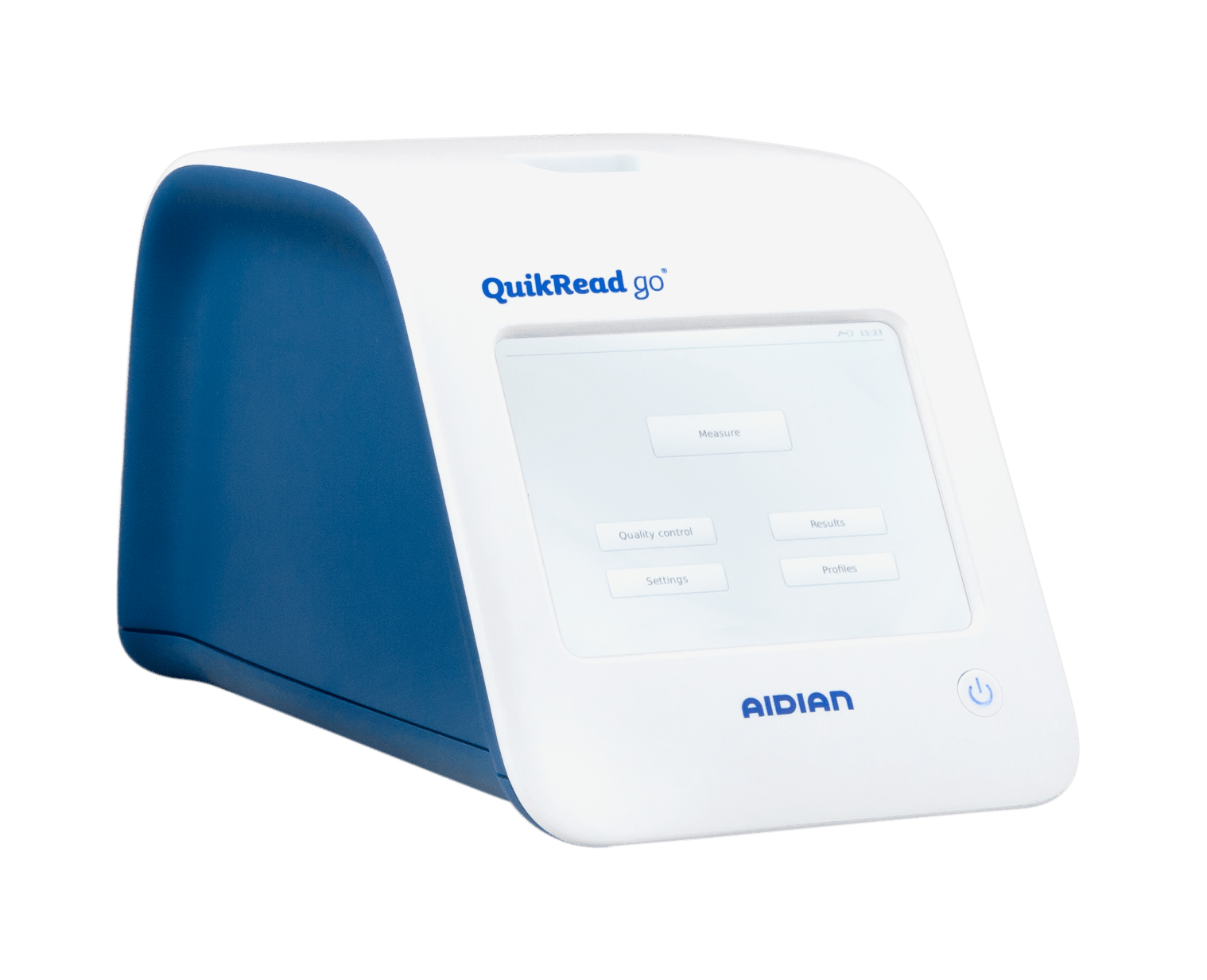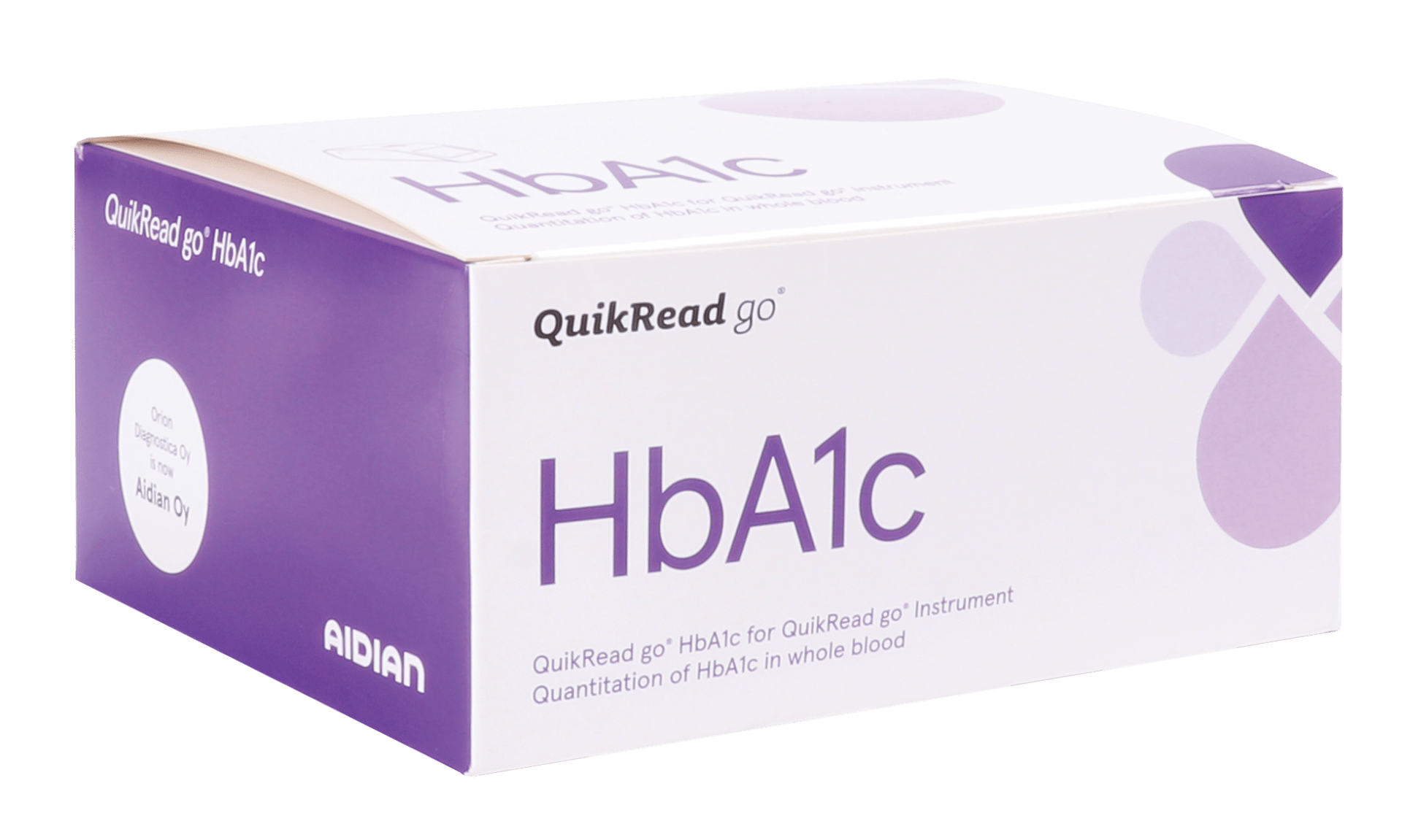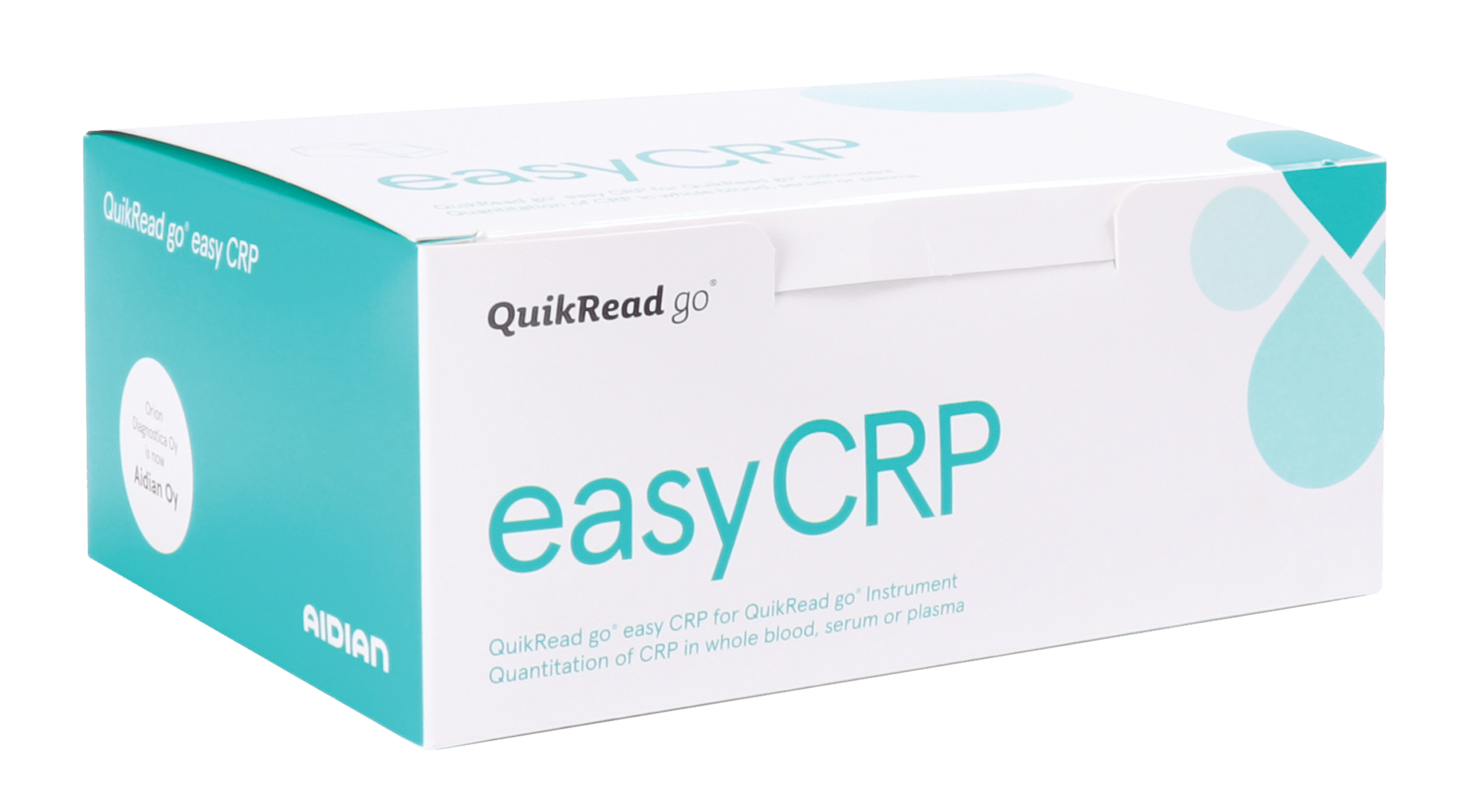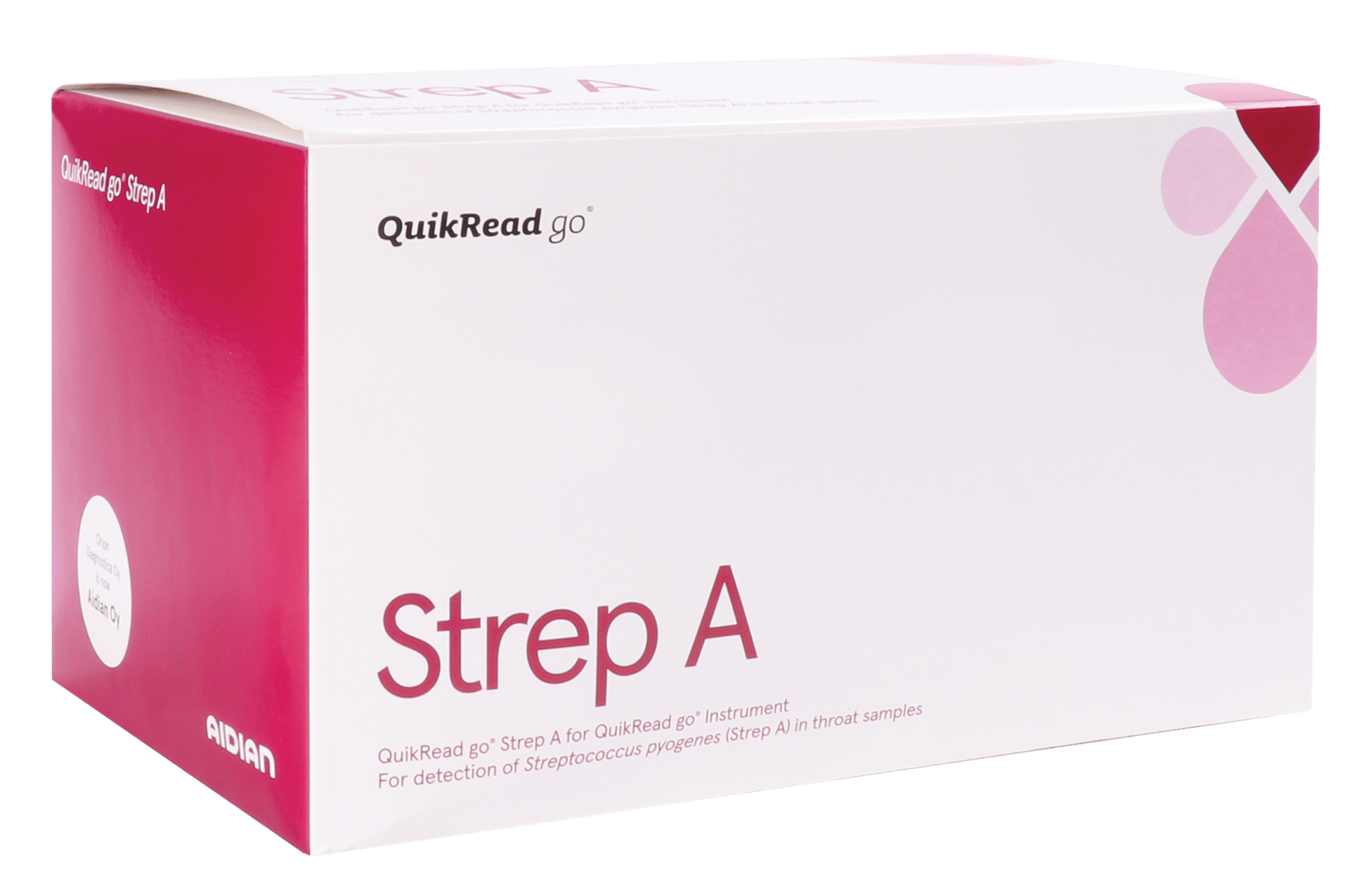QuikRead go iFOBT
QuikRead go® iFOBT is a faecal immunochemical test (FIT), designed to detect and measure human haemoglobin in faeces, specifically for identifying potential lower gastrointestinal bleeding.
For use in GP, hospital and community screening settings.
Portable, accurate and reliable results in under 3 minutes at the point of care.
Near instant results supports patient flow, meaning faster treatment implementation and a better patient pathway, outcome and experience.
Product Overview
QuikRead go® iFOBT test can be easily utilised in any community setting, GP offices or hospital. The measurement is carried out with the QuikRead go® point of care analyser, which is fully portable and connectable to HIS/LIS systems, if required.
QuikRead go iFOBT is an immunochemical faecal occult blood test, which supports early diagnosis and detection of colorectal cancer and other bowel-related conditions. It is adjustable, fast and easy to use. QuikRead go iFOBT for point of care testing provides:
- rapid and accurate faecal immunochemical test (FIT) results
- quantitative (numerical) results enable the use of national recommendations
- testing close to the patient (as QuikRead go is a fully portable device, that can be mains or battery-powered)
- comparable with laboratory FIT results
- instrument-read results, which are automatically stored
- bi-directional connectivity to LIS/HIS
- measuring range between 10-200 µg Hb/g from faecal samples
- handy and hygienic sampling vial
Many people do not experience symptoms in the early stages of CRC. However, the blood vessels of colorectal polyps or cancers are often fragile and easily bleed into the colon or rectum. In healthy individuals, small quantities of lower gastrointestinal bleeding is normal, but it may also be a symptom of a gastrointestinal disorder. In symptomatic patients, point of care (POC) QuikRead go iFOBT provides quantitative information on excessive bleeding and aids in triaging patients for further gastrointestinal tract investigations, such as colonoscopy. FIT levels also correlate with cancer severity[1,2].
Users of the QuikRead go instrument and tests can benefit from CPD accredited training on Una Health’s e-learning platform. Contact us for more details.
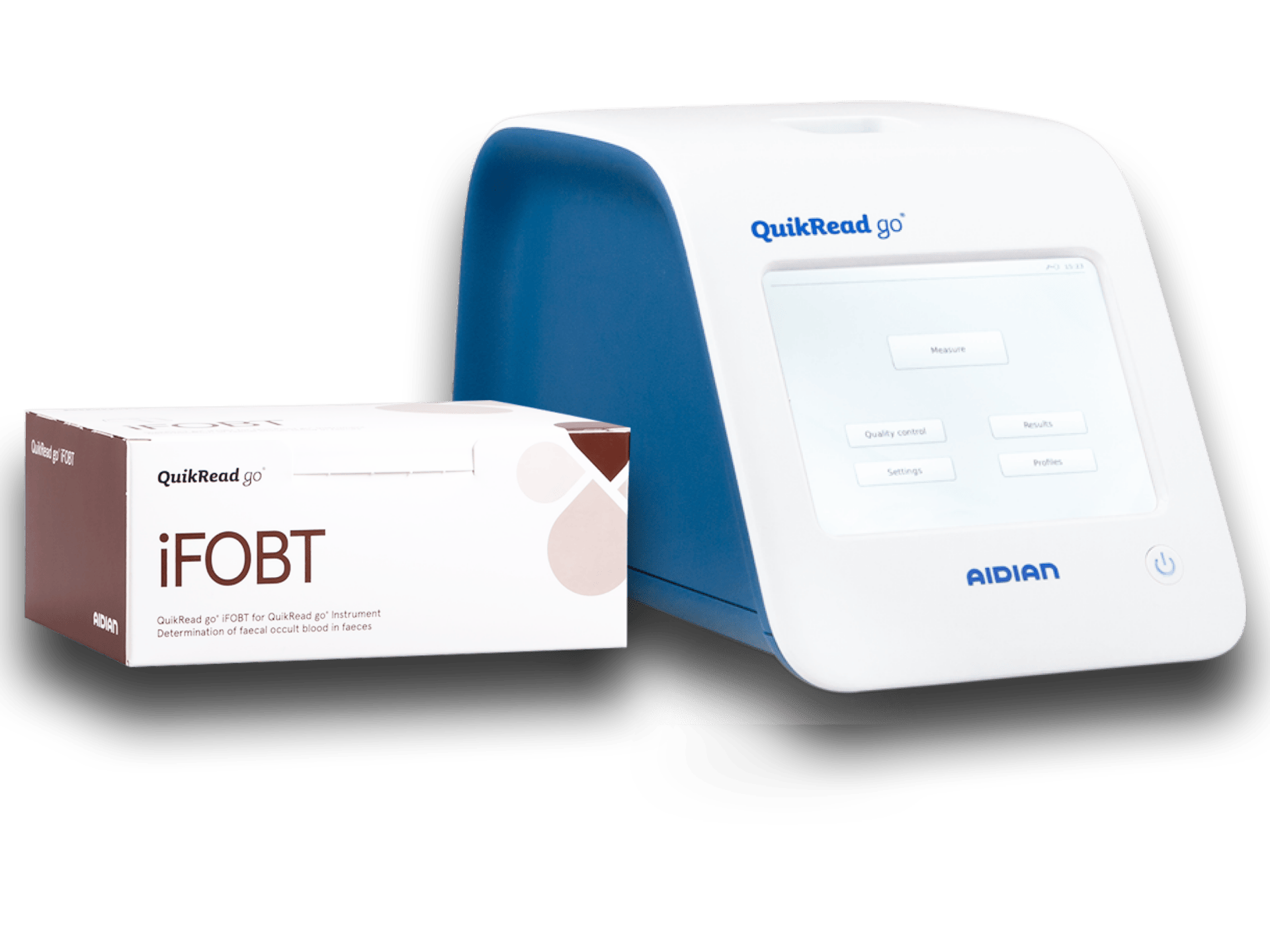
Find out more from this first observational study for point of care faecal immunochemical testing, where QuikRead go analyser for iFOBT was used within a clinic setting to demonstrate sensitivity for colorectal cancer in 2 week wait cohort.
“This study has demonstrated the clinical utility of using FIT at the point of care to risk stratify patients. POC FIT may be used in conjunction with clinical assessment. Such application can effectively filter and triage referrals, rationalize investigations, protect endoscopy and radiology capacity, cut costs and improve efficiency within the TWW pathway.”
QuikRead go iFOBT – How to perform the test?
References and further reading:
- Navarro M et al. Fecal hemoglobin concentration, a good predictor of risk of advanced colorectal neoplasia in symptomatic and asymptomatic Patients. Front Med (Lausanne) 2019: https://www.frontiersin.org/articles/10.3389/fmed.2019.00091/full
- Mclean W et al. Diagnostic accuracy of point of care faecal immunochemical test[1]ing using a portable high-speed quantitative analyser for diagnosis in 2-week wait patients. Colorectal Disease 2021: https://onlinelibrary.wiley.com/doi/10.1111/codi.15780
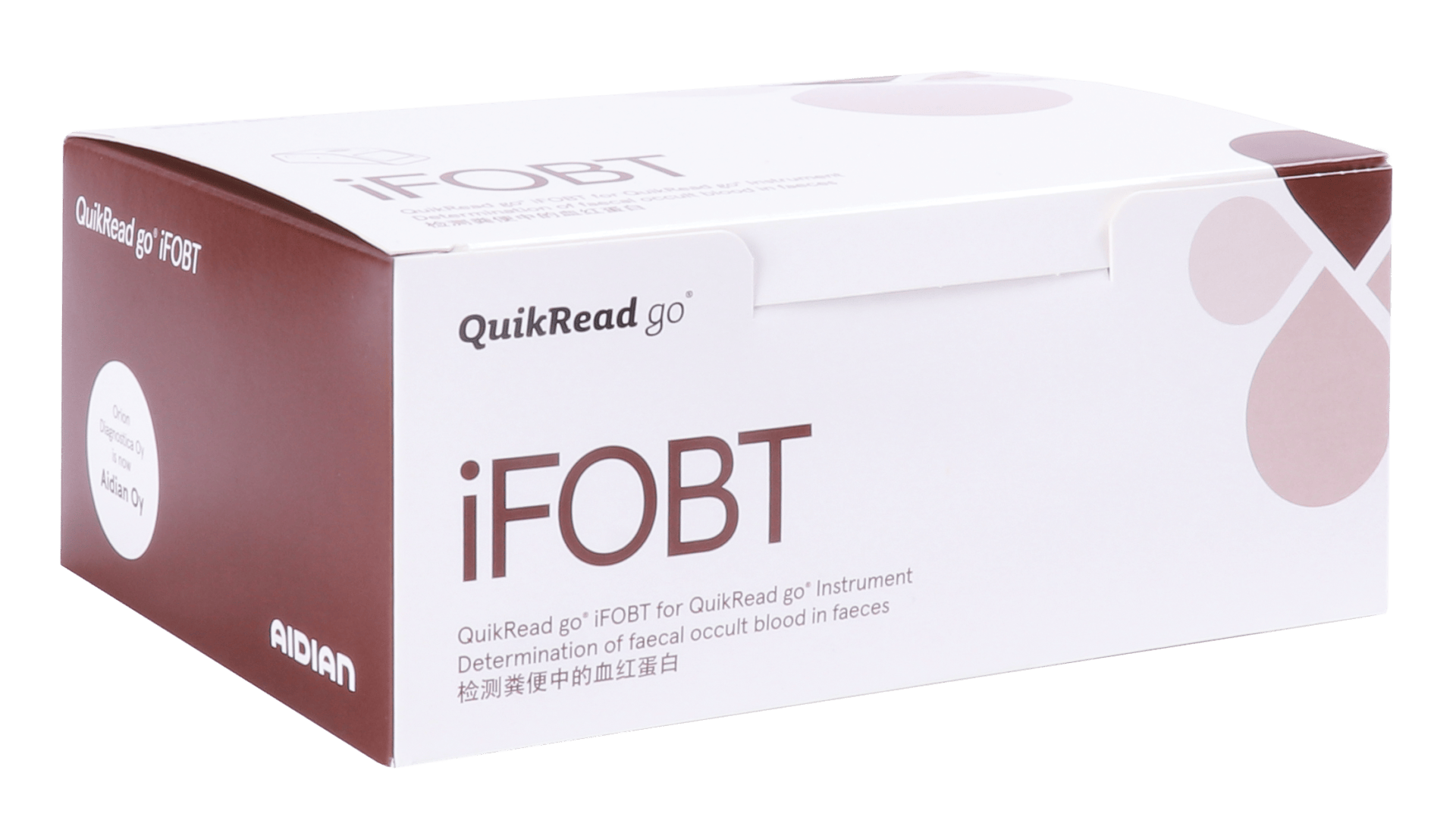
How to collect a sample on QuikRead go iFOBT
This video shows how to use Aidian’s QuikRead iFOB Sampling vial. QuikRead go iFOBT is an immunochemical test for detection and quantification of human haemoglobin in faeces in case of suspected bleeding from the lower gastrointestinal tract. The sample is collected with QuikRead iFOB Sampling vial. The video is for informative use only, kindly always refer to the latest package insert in the kit.
How to perform a FIT test on QuikRead go iFOBT?
This video shows how to use Aidian’s QuikRead go iFOBT test. QuikRead go iFOBT is an immunochemical test for detection and quantification of human haemoglobin in faeces in case of suspected bleeding from the lower gastrointestinal tract.The measurement is carried out with the QuikRead go instrument which can be connected to HIS/LIS systems, if needed. The video is for informative use only, kindly always refer to the latest package insert in the kit.
Recently published UK papers on QuikRead go iFOBT.
Comparison of the QuikRead go® point-of-care faecal immunochemical test for haemoglobin with the FOB Gold Wide® laboratory analyser to diagnose colorectal cancer in symptomatic patients (Maclean W et al.) – view here
This study is a continuation of the previous study by Maclean et al. 2021 and used the same patients and samples. QuikRead go iFOBT was compared to a laboratory-based FIT test (FOB Gold Wide, Sentinel Diagnostics) using paired faecal samples. Colonoscopy was used as a reference method. The sensitivity, specificity, negative predictive value, and overall accuracy were reported as similar as in the previous study with a cut-off of 10 µg/g (92.9%, 70.1%, 99.7%, and AUC = 0.92, respectively). QuikRead go iFOBT had a good agreement with the lab based FIT. A slightly higher number of patients were tested negative with FOB Gold Wide compared to QuikRead go iFOBT suggesting that a higher number of patients would be referred to colonoscopy with QuikRead go iFOBT. The authors concluded that QuikRead go iFOBT is safe for clinical use and has the potential for time and cost savings, providing a better patient experience when colorectal cancer is suspected.
Diagnostic accuracy of point-of-care faecal immunochemical testing using a portable high-speed quantitative analyser for diagnosis in 2-week wait patients (Maclean W et al.) – view here
The diagnostic accuracy of QuikRead go iFOBT was examined in a prospective observational study with symptomatic patients who were referred on urgent two-week-wait referral pathway for hospital specialists because of colorectal cancer symptoms. The study aimed to confirm QuikRead go iFOBT is safe in clinical use to triage and manage patients on urgent referral pathway. When a cut-off of 10 µg/g was used, QuikRead go iFOBT had 92.9% sensitivity, 70.1% specificity, and 99.7% negative predictive value for CRC when compared to colonoscopy. The overall accuracy was very good for CRC (AUC = 0.92). The study concluded that QuikRead go iFOBT has the clinical utility to filter and triage patients for colonic investigations. For those with positive results, it may enable a fast track for colonoscopy, whereas negative results can identify those who would unlikely benefit from the colonic investigation.
Adoption of faecal immunochemical testing for 2-week-wait colorectal patients during the COVID-19 pandemic: an observational cohort study reporting a new service at a regional centre (Maclean W et al.) – view here
QuikRead go iFOBT was used with OC-Sensor in a study that examined the use of FIT testing in triaging symptomatic patients for a two-week-wait referral pathway during the COVID-19 pandemic. FIT testing was found invaluable adjunct in the identification and prioritisation of patients who need the colonoscopy most. Patients with CRC were successfully triaged for investigations and received a timely diagnosis. At the same time, the overall proportion of colonoscopies was reduced. QuikRead go iFOBT results were analysed further in the two studies published in 2021 by Mclean et al. (see above).
Assessment of the analytical performance of point-of-care faecal immunochemical tests for haemoglobin (O’Driscoll S et al.) – view here
QuikRead go iFOBT was part of the analytical performance study that evaluated three POC FIT tests (QuikRead go iFOBT, Eurolyser Cube, and OC-Sensor iO). The linearity was R2>0.97 for all three FITs. CV’s were <5% for the within run imprecision on all tested concentrations and between-run imprecision was <10% for all three systems. QuikRead go iFOBT and iO detected prozone (high concentration of Hb) appropriately. In the usability assessment, QuikRead go iFOBT outperformed the other devices due to its portability and fast analysis time. The study concluded that QuikRead go iFOBT and OC-Sensor iO were found potentially suitable for quantitation of faecal haemoglobin at the POC setting.
Product Description
Code
Size
Storage
CE Marked
Downloads
No downloads found

